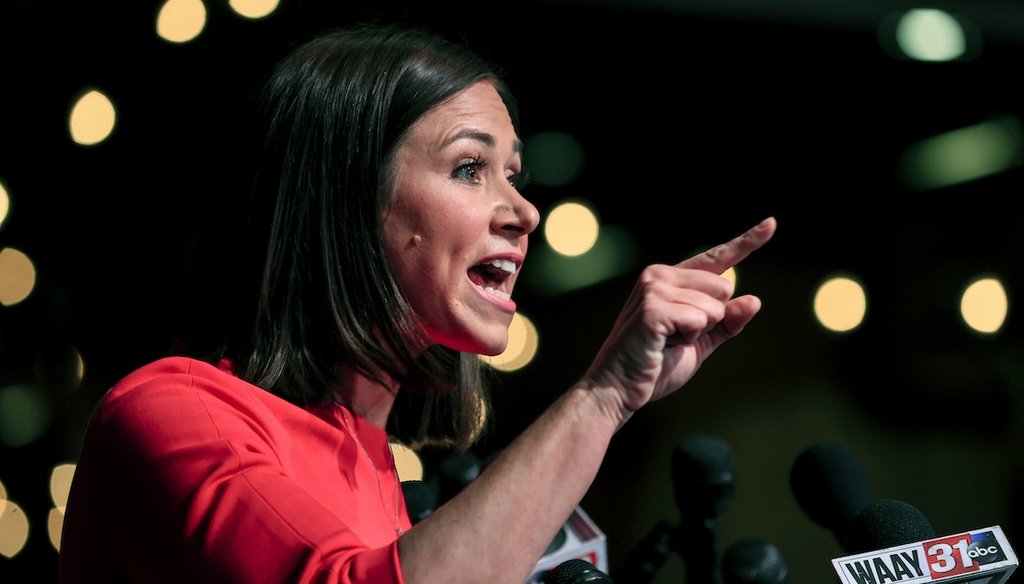Stand up for the facts!
Our only agenda is to publish the truth so you can be an informed participant in democracy.
We need your help.
I would like to contribute

Republican U.S. Senate candidate Katie Britt talks to supporters May 24, 2022, in Montgomery, Ala. (AP)
Sen. Katie Britt, R-Ala., delivered the Republican response to President Joe Biden’s State of the Union address from her kitchen table in Montgomery, Alabama. During her 17-minute rebuttal, Britt criticized Biden on immigration, the economy and crime.
"What we saw was the performance of a permanent politician who has actually been in office for longer than I've been alive," said Britt, who is 42.
"Our families are hurting. Our country can do better. And you don't have to look any further than the crisis at our southern border to see it," Britt said. "President Biden inherited the most secure border of all time. But minutes after taking office, he suspended all deportations, he halted construction of the border wall and he announced a plan to give amnesty to millions."
"We know that President Biden didn't just create this border crisis," Britt continued. "He invited it with 94 executive actions in his first 100 days."
It’s unclear which specific 94 executive actions Britt was referring to. A few months into Biden’s administration, the nonpartisan Migration Policy Institute released a report detailing 94 immigration-related Biden executive actions. However, not all the actions were directly related to the border.
Here’s the context behind Britt’s claims.
On Biden’s first day in office, the Department of Homeland Security published a memo pausing the removals of certain people illegally in the U.S. for 100 days. Federal courts quickly stopped the pause.
The memo also acknowledged that because of resource constraints, and increased illegal border crossings, removals should be prioritized for people who posed a national security or public safety threat or who entered the U.S. after Nov. 1, 2020.
"While resources should be allocated to the priorities enumerated above, nothing in this memorandum prohibits the apprehension or detention of individuals unlawfully in the United States who are not identified as priorities herein," the memo added.
In September 2021, DHS released a second memo detailing similar guidelines for Immigration and Customs Enforcement to prioritize the removal of people who have crossed the border in recent years or who threaten public safety. Courts also halted those guidelines in 2021, but they were reinstated in 2023 after a Supreme Court decision.
There have been more than 3.6 million removals, returns and expulsions from February 2021, Biden’s first month in office, to September 2023, based on Department of Homeland Security estimates.
On his first day in office, Biden issued a proclamation terminating the national emergency, former President Donald Trump used to divert Defense Department funding to build additional border barriers. However, in October 2023, the Biden administration resumed barrier construction using money Congress had previously appropriated. The administration also has spent millions on barrier repairs.
Immigration experts have questioned barriers’ effectiveness at reducing illegal immigration.
Instead of lowering the number of people crossing, barriers have prompted people mainly to try crossing at different parts of the border, David Bier, immigration studies director at the libertarian Cato Institute told PolitiFact in July 2023.
"Amnesty" is a political term that can be defined narrowly as giving people in the U.S. illegally citizenship or broadly to mean any policy favorable to people in the U.S. illegally.
On his first day in office, Biden proposed the U.S. Citizenship Act of 2021 to provide a citizenship path for farmworkers and immigrants who came to the U.S. illegally as children and for beneficiaries of Temporary Protected Status. House Democrats introduced the bill in February 2021, but it did not advance.
More recently, Biden said he would sign the Senate’s bipartisan immigration bill into law if it reached his desk. That bill, which failed a vote in the Senate, did not include a path to citizenship for people living in the U.S. illegally.
Britt also mentioned the killing of 22-year old University of Georgia nursing student, Laken Riley.
"This beautiful 22-year-old nursing student went out on a jog one morning, but she never got the opportunity to return home," Britt said. "She was brutally murdered by one of the millions of illegal border crossers President Biden chose to release into our homeland."
Jose Ibarra, the man charged with Riley’s killing, illegally crossed the U.S.-Mexico border in September 2022. Ibarra was paroled in, allowing him to be released into the U.S. to await further immigration proceedings, according to Immigration and Customs Enforcement.
Biden does not decide who is released into the country. Border officials decide whom to release into the U.S. because they lack enough resources to detain everyone who illegally crosses U.S. borders.
PolitiFact Staff Writer Samantha Putterman contributed to this report.
Our Sources
Linked in story.































